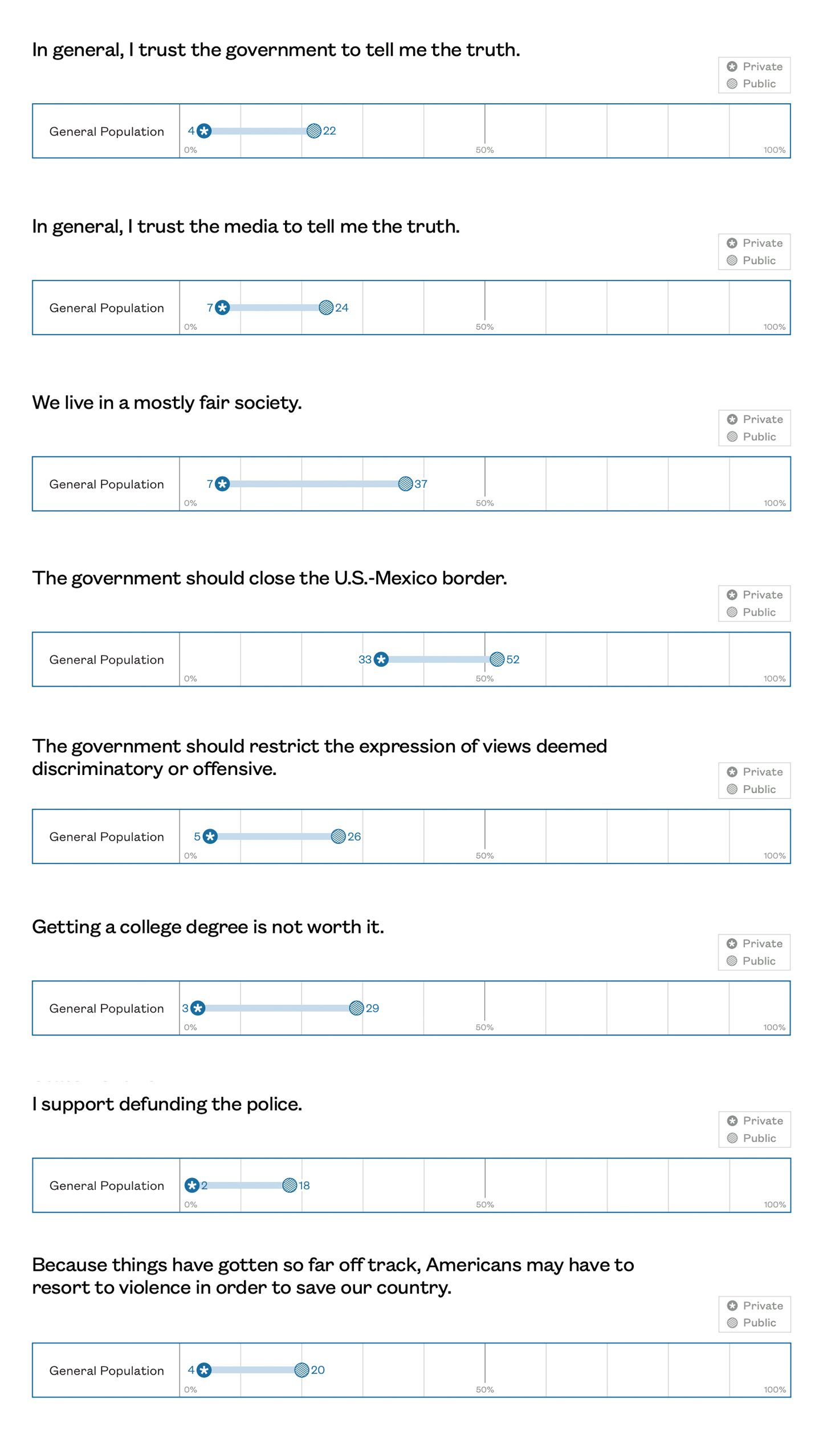
There are stark gaps between what Americans say they think and what they really think about hot-button political issues, a new study finds.
Why it matters: Politicians and institutions take cues and shape policies based on public opinion — but these stated opinions might not truly reflect what people want.
- 61% of Americans admit to "self-silencing" — keeping their true opinions on sensitive topics to themselves.
Zoom in: Populace, a Massachusetts think tank, and YouGov polled Americans to gauge their public and private views on topics like trust in government, gun control, higher education and the border.
How it works: Respondents were provided a mix of traditional polling questions and other questions using a list experiment method, or item-count technique, that provides them with a greater sense of anonymity.
- This process allows researchers to find the gap between what people say versus how they privately feel.
1. Trust in institutions is already low. But in private, even fewer Americans say they trust government and media. Some gaps are even wider among subgroups.
- 36% of Democrats and 14% of Republicans say they trust government to tell the truth, but just 5% and 2% agree with this statement privately.
- 42% of Democrats and 16% of Republicans say they trust the media to tell the truth. Just 9% and 3% really believe this.
2. Perceptions of fairness are also critically low, says Todd Rose, CEO of Populace. 37% of Americans say the country is mostly fair publicly. Just 7% privately think so.
- Historically, this sort of sentiment is what makes societies socially and politically volatile — and even precedes revolutions, says Rose.
3. But Americans generally agree on some of the most divisive issues of the day.
- Defunding the police — a movement that was politically popular among younger Americans on the left — is not as popular as it might seem, the poll shows. 28% of Gen Zers and 27% of Democrats say they support the movement, but just 2% and 3% privately agree. That's not far from the 1% of Boomers and 1% of Republicans who privately say they support the movement.
- Americans also agree on the importance of diversity. In private, some two-thirds of Americans agree more diversity would be good for the country, 64% think legal immigrants do more to help the country than hurt it, and 58% support the Black Lives Matter movement.
- There's a 20-point gap between public and private opinions on closing the border with Mexico. Even among Republicans, 85% publicly support closing the border; 68% privately do.
The national debate over whether college is worth it rages on, but the vast majority of Americans — across generations and party lines and those with and without degrees — privately believe it is.
- Most Americans believe the government should protect speech, even if it's offensive.
- And as political violence rises, the vast majority do not endorse it.
The bottom line: We don't say what we think — and that has social and political consequences.
- "It would be tragic if we got led by a vocal fringe on both sides into positions and values that we don't privately hold, but that come to represent us as a country," Rose says.
Methodology: The survey was conducted for Populace by YouGov between May 16-June 24, 2024, among 19,879 respondents. The respondents were provided a mix of traditional polling questions and other questions using a list experiment method, which guarantees privacy.
- These kind of results do not have the same MOE measurements as traditional public opinion polling
- In the list experiment survey, respondents are never asked to directly share their opinion. Instead, they read a list of statements and choose the number with which they agree.
- By comparing a group of people who see a list that includes the sensitive statement to a group who sees a list without it, inferences can be made about the prevalence of that private opinion in the population.

